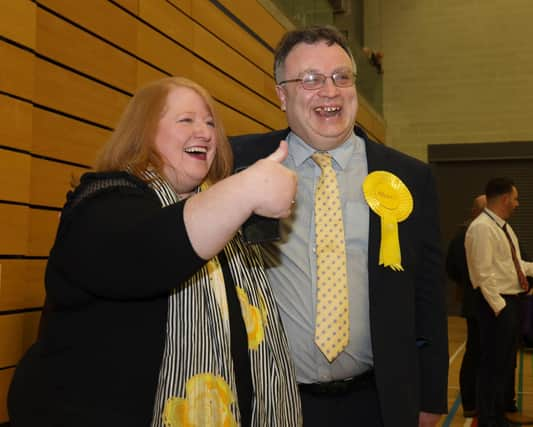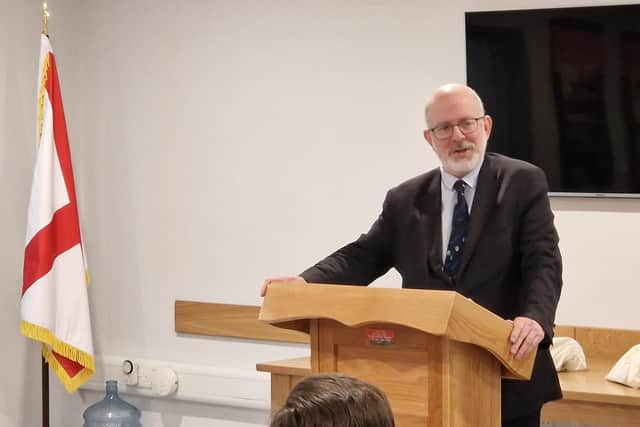Dean Godson: A united, confident unionism is the prize: political realism is the price


Unionism has been left scarred and divided by Brexit. Unionists now face the political and electoral consequences of competition amongst three unionist parties for the votes of the demographically smaller unionist community as well as the impact of the cultural shifts on unionism that have contributed to the strengthening of the Europhile Alliance Party.
Just because barriers to cooperation between the DUP and the UUP — represented by differences of party culture, organisational vested interests, past conflicts and personality — have been high does not change the prognosis. Both parties should recognise the transcendent importance of recuperating their combined strength at Westminster in the forthcoming general election. To do that they might profitably consider the case of the DUP’s recovery after the assembly election of 2017 which saw a significant boost for the nationalist parties who came within one seat of equality with the combined DUP/UUP seat share. Two months later, in the Westminster election, the DUP vote soared by 67,000, a 59% increase in comparison with 2015, winning 36% of the vote and ten seats. The spectre of unionists losing Westminster seats after the shock of the assembly results mobilised the unionist electorate.
Advertisement
Hide AdAdvertisement
Hide AdThe possibility that post-Donaldson disarray could result in the potential loss of two more key Westminster seats to Alliance at a time when it could be followed by a Sinn Fein presence in government in Dublin and a Labour administration in London should be the basis for a similar mobilisation.


The then Senator Eoghan Harris, addressing the Castlereagh Central branch of the UUP in 2007, urged a UUP/DUP merger where ‘The breadth of vision and pluralism of the UUP could complement the hard-edged but more organisationally vital culture of the DUP’. A new party could ensure that unionism punched above its weight. These arguments deserve even more pressing consideration in present circumstances. Electoral cooperation should be the first step, with the goal of winning Fermanagh and South Tyrone and North Down and retaining East Belfast and Lagan Valley, but it should not end there.
In a world where two out of three unionists agree, all that the three-way split in unionism achieves is a loss of seats. In 1922, Winston Churchill spoke of the dreary steeples of Fermanagh and Tyrone emerging once again, with the integrity of the quarrel between nationalist and Orange unaltered in the cataclysm which had swept the world. It is possible for the integrity of the quarrel within unionism to remain unaltered by the crisis and regardless of the consequences. However, those consequences are not just in the loss of overall unionist seats at Westminster but in potentially failing to achieve that far more significant aim of maintaining the Union through building and sustaining a broad coalition of unionists committed to and capable of making a success of Northern Ireland.
Currently, there are no manifest differences between the DUP and the UUP in policy terms. There is only one winner from their quarrel — the Alliance. Alliance’s agnostic position on the constitutional future of Northern Ireland reflects the cross-community basis of its electorate and also the importance of Catholic support in constituencies like North Down, East Belfast and Lagan Valley where Sinn Fein and the SDLP stand no chance; however, Alliance represents a significant challenge to unionist incumbents in two constituencies, one of which Naomi Long won in 2010. A University of Liverpool survey shows that 37% of Alliance members would support Irish unity in a border poll whilst only 27% of its members would support staying in the UK — although the majority of its electoral support is pro-Union. Alliance’s record on full implementation of the protocol showed a major lack of political judgement for which it should be held to account. A united unionism can expect to do well in pulling unionist voters back from Alliance.
Advertisement
Hide AdAdvertisement
Hide AdThe TUV offers a different perspective on unionism to the main unionist parties, but it offers no viable political strategy. Unionism cannot afford a policy that drives it into a brick wall. Tempting as it may be to side with rejectionism, it goes nowhere. No future UK government — not least under Labour — can be expected to challenge 27 EU states and the USA in throwing off the protocol. There is no possible Parliamentary majority for such an action. The one vote held on the Windsor Framework was approved by 515 votes and rejected by 29. That is 5% support for TUV’s position. Both times that the UK government sought to reject elements of the protocol unilaterally it was forced to backtrack in the face of both domestic and international opposition — though on both occasions its actions facilitated concessions from the EU.
The convulsions of the last seven years have resulted in the government issuing the most pro-unionist statement of policy in a century. Whatever views you have on the protocol and the subsequent Windsor Framework, it must be recognised that the Safeguarding the Union document represents a substantial set of commitments — moral, legal, political and practical — by the British government to the Union. Importantly, it marks a shift in the UK government’s position. In 2017 it had committed, under intense pressure, to support the so-called ‘all-island economy’.
This was the source of much of the difficulty that followed. It now recognises that there is no ‘all-island economy’, only cross-border sectors of the Northern Ireland economy; the government will expunge the duty for ministers to support the ‘all-island economy’ from the statute book — to the consternation of shadow Secretary of State Hilary Benn. Government policy now reflects a clear commitment to maintain the Union based on the legitimate wishes of a majority of the people of Northern Ireland, thus upholding the core principle of consent enshrined in the Belfast Agreement. A recent Policy Exchange paper ‘Closing the Back Door: Rediscovering Northern Ireland’s Role in British National Security’, argues that maintaining the Union includes upholding the UK’s legitimate strategic interests in Northern Ireland — all the more relevant given the exponential rise in the maritime threat posed by Russia to Western interests.
The cause of unionism is more likely to be served by embracing Safeguarding the Union and working with it than by rejecting it. Both the DUP and the UUP’s policies support this approach — and for good reason. The case for unity is not just about winning seats, but to win the argument for the Union and win the support that sustains it. A united, confident, intellectually robust and creative unionism is the prize. Political realism is the price.
Advertisement
Hide AdAdvertisement
Hide AdIn facing coming challenges, unionists of all political party backgrounds and of none who share the same beliefs and values should take the opportunity to ask some fundamental questions about the future and whether a house divided against itself can ultimately stand. It would be better if this reflection took place before the electoral cost of division is even more evident than is presently the case. It should start with electoral coordination in this year’s general election, but it should look forward to engineering a profound reorganisation of the political parties representing unionism. The time for unity and an outward looking, confident and robust unionism has come. Whether this can be achieved will determine the future of Northern Ireland and of the United Kingdom itself.
Lord Godson’s article is based on his David Brewster Memorial Lecture ‘Unionism and Orangeism Before and After Brexit’ delivered on Monday. He is a member of the House of Lords Sub-Committee on the Windsor Framework and author of ‘Himself Alone: David Trimble and the Ordeal of Unionism’ (2004).